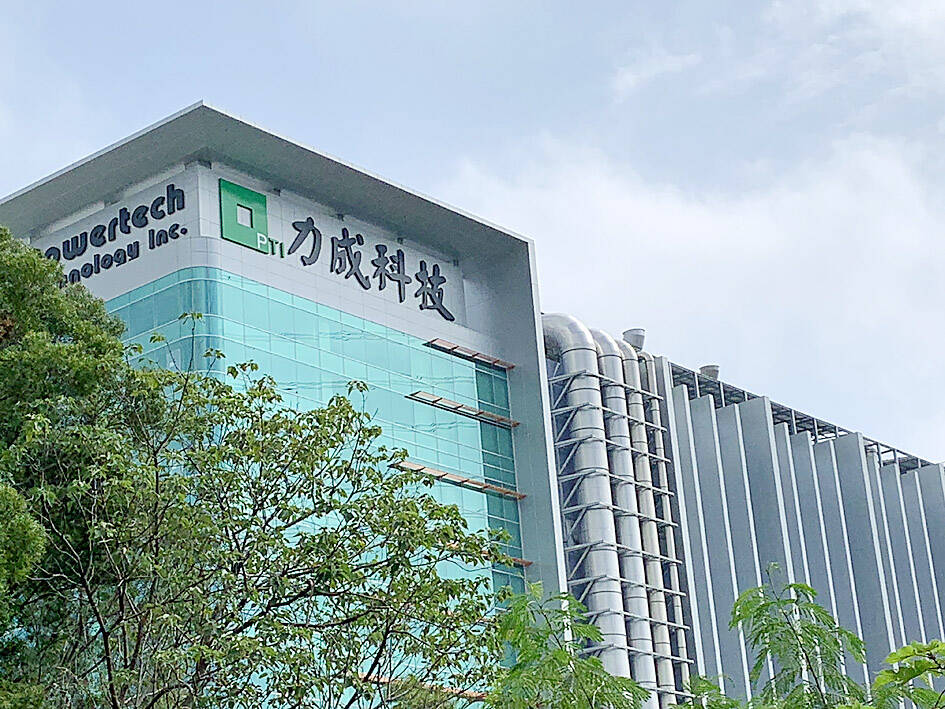Powertech Technology Inc (力成科技), a memorychip testing and packaging services provider, yesterday said that revenue would grow this year mainly driven by chips used in applications such as artificial intelligence (AI) PCs.
The positive prospects come after the company’s revenue declined 16.07 percent last year to NT$70.44 billion (US$2.26 billion) from NT$83.93 billion in 2022 due to weak demand for electronics amid high inflation and economic uncertainty, Powertech said.
The company expects moderate growth this year, with momentum gaining speed from the second quarter and being sustained for the rest of the year, Powertech chief executive officer Boris Hsieh (謝永達) said at a media gathering in Taipei.

Photo: Grace Hung, Taipei Times
As Intel Corp, Microsoft Corp and several PC makers are embracing AI features this year, new AI devices are expected to boost demand for higher-density and faster-speed DRAM chips such as advanced DDR5 and high-bandwidth-memory (HBM) chips, which would in turn lead to a surge in demand for chip testing and packaging services and benefit Powertech, the Hsinchu-based company said.
“The introduction of AI PCs is to bring major changes to the industry this year,” Hsieh said.
The company is tapping new advanced packaging technology for HBM chips that are used in high-speed-computing devices, Hsieh said.
The first batch of such products using its advanced packaging technology, called panel-level-fan-out-on-substrate technology, is to be delivered to a Japanese customer at the end of this year at the earliest, he said.
Powertech’s new advanced packaging technology is a more cost-efficient solution to the much-talked-about chip-on-wafer-on-substrate technology used in AI chips, he added.
With rising demand for advanced packaging technology in the next few years, Powertech plans to “resume active capital spending from the second half of this year,” Powertech chairman Tsai Du-kung (蔡篤恭) said.
Hopefully, the company’s capital expenditure would reach between NT$17 billion and NT$18 billion in the upcoming years, Tsai said.
Powertech said this year it plans to increase spending on advanced packaging equipment after spending about NT$10 billion last year.

Semiconductor business between Taiwan and the US is a “win-win” model for both sides given the high level of complementarity, the government said yesterday responding to tariff threats from US President Donald Trump. Home to the world’s largest contract chipmaker, Taiwan Semiconductor Manufacturing Co (TSMC, 台積電), Taiwan is a key link in the global technology supply chain for companies such as Apple Inc and Nvidia Corp. Trump said on Monday he plans to impose tariffs on imported chips, pharmaceuticals and steel in an effort to get the producers to make them in the US. “Taiwan and the US semiconductor and other technology industries

CHIP WAR: Tariffs on Taiwanese chips would prompt companies to move their factories, but not necessarily to the US, unleashing a ‘global cross-sector tariff war’ US President Donald Trump would “shoot himself in the foot” if he follows through on his recent pledge to impose higher tariffs on Taiwanese and other foreign semiconductors entering the US, analysts said. Trump’s plans to raise tariffs on chips manufactured in Taiwan to as high as 100 percent would backfire, macroeconomist Henry Wu (吳嘉隆) said. He would “shoot himself in the foot,” Wu said on Saturday, as such economic measures would lead Taiwanese chip suppliers to pass on additional costs to their US clients and consumers, and ultimately cause another wave of inflation. Trump has claimed that Taiwan took up to

A start-up in Mexico is trying to help get a handle on one coastal city’s plastic waste problem by converting it into gasoline, diesel and other fuels. With less than 10 percent of the world’s plastics being recycled, Petgas’ idea is that rather than letting discarded plastic become waste, it can become productive again as fuel. Petgas developed a machine in the port city of Boca del Rio that uses pyrolysis, a thermodynamic process that heats plastics in the absence of oxygen, breaking it down to produce gasoline, diesel, kerosene, paraffin and coke. Petgas chief technology officer Carlos Parraguirre Diaz said that in

Japan intends to closely monitor the impact on its currency of US President Donald Trump’s new tariffs and is worried about the international fallout from the trade imposts, Japanese Minister of Finance Katsunobu Kato said. “We need to carefully see how the exchange rate and other factors will be affected and what form US monetary policy will take in the future,” Kato said yesterday in an interview with Fuji Television. Japan is very concerned about how the tariffs might impact the global economy, he added. Kato spoke as nations and firms brace for potential repercussions after Trump unleashed the first salvo of